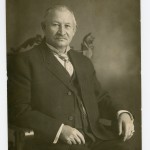 A couple of years before he died, Col. Joseph Askew commented on the town he helped found—Menahga. Joseph built the first frame building in Menahga (which was also the town’s first hotel), and one of the first (if not the first) sawmill in town. He was also the town’s first mayor. In short, Menahga was a town in which he had invested so much of his time, money, and effort as a younger man. Despite his investment in the development of the town, Joseph moved to Wadena shortly after 1900. In the summer of 1908, a couple of years before he died, Joseph was asked to discuss how the village had changed over the years.
A couple of years before he died, Col. Joseph Askew commented on the town he helped found—Menahga. Joseph built the first frame building in Menahga (which was also the town’s first hotel), and one of the first (if not the first) sawmill in town. He was also the town’s first mayor. In short, Menahga was a town in which he had invested so much of his time, money, and effort as a younger man. Despite his investment in the development of the town, Joseph moved to Wadena shortly after 1900. In the summer of 1908, a couple of years before he died, Joseph was asked to discuss how the village had changed over the years.
I haven’t had the opportunity to see the original of this article yet, but am instead relying on a transcription made by Rebecca Komppa, a local history journalist in the Menahga area.
Continue reading






